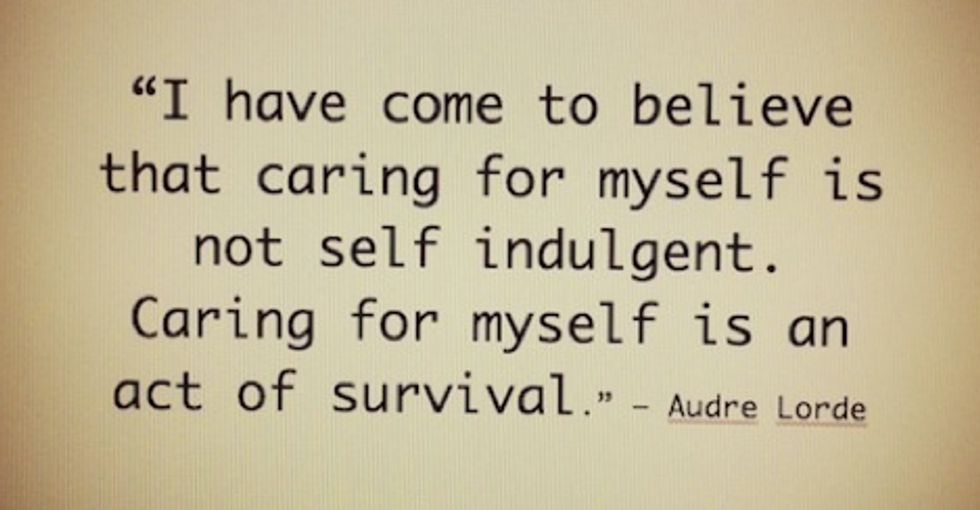When you hear or read the word ‘self-care’, what usually comes to mind? Do you think of pampering yourself by wearing face masks? Do you think of a specific food that always cheers you up when you have it because it reminds you of a good time in your life? Or do you think of something else that’s completely different, but could be considered just as frivolous?
Instead of making or buying face masks, herbal teas, or doing other “Internet-approved” methods of self-care, here’s how to care for yourself: no frills, no fuss, just the very basics.1. Drink water!
This may sound like a no-brainer, but it can be so easy to forget that you need to drink water throughout the day to stay hydrated. College students drink a lot of coffee, tea, or other caffeinated beverages, and it can be beneficial to drink more water than coffee or any other drink that you could have.
It’s generally recommended that you drink one or two liters of water each day. I know that sounds like a lot, but it’s going to be what’s best for you overall. If you get a portable, reusable water bottle - preferably one with a straw - you’ll be able to carry it around with you to your classes, maybe even in a bag to your job so that you can have water while you’re on break. The straw makes it easier to drink more water than you would if you were simply tilting the glass or bottle to drink from.
2. Eat regularly.
Again, this is going to sound like a “well, duh” type of tip. However, it’s surprising how often college students forget that it is important to eat regular meals every day. I am definitely guilty of not eating enough during the day, or I will eat too much junk food. Those are both things that you want to avoid. Take advantage of your college’s meal plan, or of friends who have the meal plan, and aim to eat six small meals every day.
If you are forgetful, it can be helpful to set reminders on your phone or on your laptop, or even to enlist a friend to eat with you when you’re both free, in case you do not have a smartphone. In addition, if you do not have a meal plan at your college, or you live off-campus, you can always prepare meals at the start of each week and keep them refrigerated or frozen so that when you are home after classes, you can dig in to food that’s already prepared for you.
3. Try to set a semi-regular sleep schedule.
I know, I know. It feels impossible to set any form of a sleep schedule when there are papers to be written, projects to be completed, and exams to study for. However, sleep is incredibly important. Not only is it a pleasant escape from the pressures of reality, it allows your body to recover from the day’s events and repair itself.
If you’re the owner of an iPhone and have updated it to its most recent update, you can engage NightShift on your phone by scheduling it, or going into your settings to manually turn it on. You can schedule it to change to warmer tones on your screen - which should signal your brain to go to sleep sooner - at any hour of the night, and turn it off at any hour of the day.
Additionally, it is important to pick classes that are at times during which you are at your best functionality. Whether that means the bulk of your classes take place in the morning, in the afternoon or in the evening all depends on you and your body. it is necessary to be in touch with what your body needs and to figure out - perhaps during a break from school - how much sleep you need to be happy.4. Hang out with your friends regularly.
No matter who you are or where you are, you need a support system. This support system should be full of people you trust and love who also trust and love you in return. No man, woman, or otherwise-identifying person is an island.
It can be easy to isolate yourself during the academic year due to obligations with classes, clubs, work and other extracurriculars. However, isolating yourself is basically the opposite of what you want to do. While your alone time or “me time” is important, it is just as important to strike a balance between being alone and being surrounded by people who love you that you also love.
Try to arrange weekly meals with your main squad by making a group text message, or by using the group chat feature on Facebook. You can use any number of social media outlets in order to communicate with your friends, which can be especially helpful for coordinating hang-outs when you and your friends are busy young adults who are learning who they are.
5. Treat yo’self.
Despite the fact that I started this article talking about how self-care isn’t always about frivolous things, it is entirely possible to treat yourself without going Tommy Haverford and Donna Meagle on the whole situation.
Sometimes, treating yourself can be skipping that one class you’ve gone to for a month straight. It can be splurging to buy yourself that really nice new sweater, book, journal, food, drink or anything else that you’ve been eyeing. Treating yourself can even be spending a whole day alone, doing absolutely anything and everything that you’ve wanted to do.
Remember that caring for yourself does not have to be frivolous and luxurious. There are little ways that you can practice self-care in your everyday life that remain practical. You deserve to be well.


























